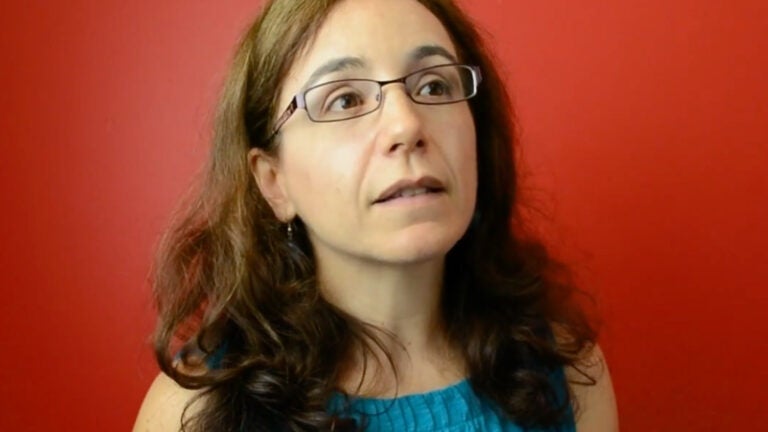
Monica Perez Jolles is a co-investigator with the Padres Efectivos parent mentor group.(Photo/UNC Cecil G. Sheps Center for Health Services Research)
Parents advise investigators on mental health treatment in children
Trials with Latina mothers take place in settings where the research can promptly benefit the patient
https://www.youtube.com/watch?v=9Ri_oYz1mvc&feature=youtu.be
Monica Perez Jolles, an assistant professor at the USC Suzanne Dworak-Peck School of Social Work, created and led a parent mentor group as part of a randomized pragmatic trial called “Padres Efectivos: Skills Latina Mothers Use to Get Healthcare for Their Children.”
Pragmatic clinical trials take place in settings where everyday care happens, such as community clinics, hospitals and health systems, rather than a lab, with the goal of speeding research into practice, where it can have the greatest and quickest benefit for the patient.
The Patient-Centered Outcomes Research Institute project started at the University of North Carolina at Chapel Hill, where Perez Jolles completed a National Research Service Award Individual Postdoctoral Fellowship, in collaboration with El Futuro, a community-based mental health clinic in Durham, N.C.
Research protocols
Perez Jolles invited Latina mothers who had taken part in the Padres Efectivos study and expressed interest in giving back to their communities to participate as collaborators and give advice on the research process. The mentor parents met quarterly with researchers for over three years to discuss the design and implementation of research protocols, as well as help researchers translate findings and contribute to dissemination efforts.
Ultimately, we learned that Latino parents have invaluable insight to offer when they are included in research studies that seek to improve services for their children’s mental health needs.
Monica Perez Jolles
“Ultimately, we learned that Latino parents have invaluable insight to offer when they are included in research studies that seek to improve services for their children’s mental health needs,” she said. “They make good partners in research when invited, not just study subjects.”
Community-based participatory research is not new, but has been gaining support in recent years, particularly in addressing health inequities. The concept involves community-based organizations such as churches, neighborhood organizations, community residents and other social organizations helping researchers recruit subjects and play a direct role in the early stages of a study.
Connecting members of the community and using their knowledge has been shown to help providers and patients make better health decisions and improve overall care. Unlike traditional research, this approach can often provide immediate benefits from the results of the research and put the new knowledge in the hands of those who need to make changes.
“Engaging parents in every aspect of the study demonstrated to the community-based partner clinic that researchers are truly committed to their clients and consider them partners,” Perez Jolles said. “This built trust between us and contributed to the study’s recruitment goals that have exceeded expectations.”
Listening to parents
An important finding researchers learned from the parent mentor group was that teachers are strong influencers in motivating parents to pursue mental health services for their children. Mentor parents also shared that their inexperience in navigating the health care system can play a critical role in their children not getting the treatment they may need.
“As a result of our parent discussions, we added two measures to our study protocols,” Perez Jolles said. “The moms gave us great feedback, prompting us to look at the quality of school interactions and the confidence level of parents in interacting with providers.”
She added that including parent voices not only increased the quality of the research process but also offered a side benefit of educating and empowering the Latina mothers.
“By participating, we are not only helping health service providers in understanding the distinct needs of the Hispanic community, but we can also make their jobs more effective,” said one of the mothers in the mentor group who chose not to be identified. “We as parents also discover that we have the necessary ammunition to help the mental health of our children and our entire community.”
The parent mentor group’s work will be continued with funding for a new project from the Centers for Medicare and Medicaid Services.
To learn more about the advisory group, view a video created by Noel Heaney, a neurobiology student at the University of St. Andrews in Scotland, as part of a project while shadowing principal investigator Kathleen Thomas.
